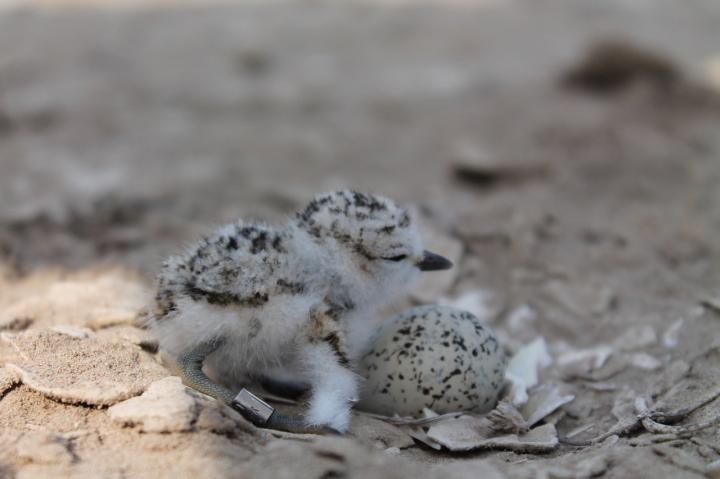However, their parental care depends on the survival prospects of the chicks

Credit: Clemens Küpper
In snowy plovers, females have overcome traditional family stereotypes. They often abandon the family to begin a clutch with a new partner whereas the males continue to care for their young until they are independent. An international team led by scientists from the Max Planck Institute for Ornithology in Seewiesen, Germany, has now investigated the decision-making process that determines the duration of parental care by females. They found that offspring desertion often occurs either under poor environmental conditions, when chicks die despite being cared for by both parents, or when chicks have a good chance of survival even without the female.
It seems cruel and somewhat senseless when bird parents desert their vulnerable young to mate again. However, theoretical and experimental studies show that this is often beneficial for the parents, even if they have already invested energy and time in the brood. After all, re-mating after deserting an unsuccessful brood can improve their overall reproductive success.
A team of scientists led by researchers of the Max Planck Institute for Ornithology in Seewiesen, Germany, has now investigated in more detail which factors cause female parents to desert their broods. They studied snowy plovers (Charadrius nivosus) that often breed on salt flats or at brackish inland lakes. This barren environment puts great pressure on parents, as temporary salt ponds often dry up and many chicks die of thirst or starvation. “Males have survival advantages at all life stages”, says Clemens Küpper, research group leader at Seewiesen. “Although equal numbers of females and males hatch from eggs, adult population therefore show a surplus of males.”
Reversed parental roles
As females are less abundant in the population, they have an advantage in finding mates. Therefore, the parental roles are reversed in this species: males care for the young until they are fledged, while females often leave the family and pair up with another partner for a new breeding attempt.
The research team analyzed the parental behaviour and survival of more than 260 broods over a seven-year period. Of these, more than 70 percent were deserted by the females. Although one parent is often sufficient for parental care, as the chicks are precocial and find the food on their own. However, the study shows that chicks from an abandoned brood actually survive less often than in other broods where females stay longer.
So, are snowy plover mothers making the wrong decisions here? The scientists found that broods were more likely to be deserted at the beginning of the breeding season. This makes sense because there are more opportunities for the female to mate again. The current number of chicks is also important: females are especially likely to abandon broods on days when a chick dies. “This suggests that females who initially decided to care, suddenly abandon their broods when their chicks start to die”, says Krisztina Kupán, first author of the study. These females try then to rescue their reproductive success by starting over with a new male.
Females are sensitive to environmental conditions
The researchers concluded that there are two main reasons for females to desert their brood and remate. First, the chicks have a good chance of survival with their fathers alone, so the female can leave and continue to reproduce. Second, the chicks begin to die despite both parents are caring for the brood. This means that conditions for chick rearing are so poor that additional parental care does little for the chick survival. Instead, the female tries to increase her reproductive success frequently starting to breed elsewhere. “Females are flexible and make sensible decisions,” says Krisztina Kupán. “They are sensitive to environmental conditions and stay with the chicks if they can contribute substantially to their survival.”
###
Original publication
Krisztina Kupán, Tamás Székely, Medardo Cruz-López, Keeley Seymour, Clemens Küpper
Offspring desertion with care? Chick mortality and plastic female desertion in Snowy Plovers
Behavioral Ecology, araa141
08 March 2021
Media Contact
Dr. Krisztina Kupán
[email protected]
Original Source
https:/
Related Journal Article
http://dx.




